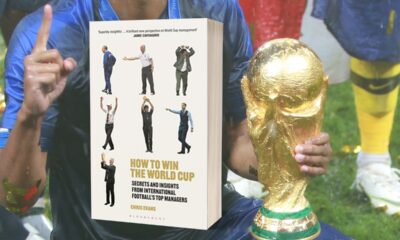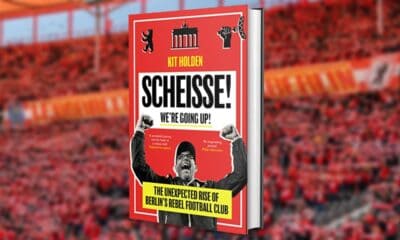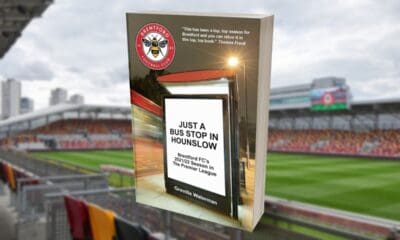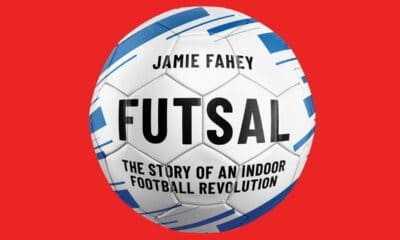John Doyle’s book The World is a Ball: The Joy, Madness, and the Meaning of Soccer is an account of one man’s travels around the world following soccer. The journey begins in 2002 and takes readers through European qualifying and World Cup matches. Doyle not only gives a recap of the contests, but he also puts the reader in the stadium to experience the emotion and pageantry that goes along with international soccer. In this interview, Doyle, who also writes for The Globe and Mail, discusses the book, his travels around the world, and soccer.
Matt Hackenmiller (MH): First off, how did you come up with the idea to write a book like this?
John Doyle (JD): Well, I wanted to be interviewed and talked about on EPL Talk, for a start. Seriously now, my first book, A Great Feast of Light, was very well received in Canada, the U.K. and Ireland. (It is less well known in the U.S. because the U.S. publisher was bought out by another company a few weeks after publication, and the book kind of got lost in the takeover.) When it came time to think of a second book, writing a book about soccer was the obvious decision – I’d been writing about the game for years. I’d covered two World Cups and one Euro tournament then and I’d become addicted and even more passionate, I guess. I wanted to explore it further, travel more to see more games in more countries. I also wanted to write a book about soccer both for the fans and for the non-addict, for people who are curious about the tournaments and what they mean.
MH: In your book, The World is a Ball: The Joy, Madness, and the Meaning of Soccer, you do a wonderful job of putting the reader in the stadiums you visited. What is your most memorable moment amongst your soccer travels?
JD: Thanks for the compliment, Matt. I worked long and hard to try for the you-are-there descriptions. It’s impossible to pick a single moment, there are so many remarkable sights and astonishing games described in the book, I hope. A major and unforgettable highlight, though, was being in Korea during the 2002 World Cup, when South Korea had an astonishing and well-deserved run to the semi-finals. The whole country – every man, woman and child – was living, breathing soccer every hour of every day. In the book I describe Korean fans weeping after a game. Korea had won, so it wasn’t weeping in anguish. They were just so exhausted, traumatized by the tension, exhilarated by the win that they were weeping with joy, their bodies shaking. It was a sort of mass lunacy, and it was fabulous. A game I will never forget is Portugal defeating England at Euro 2004 in Lisbon. It was a tense dramatic game and Portugal won on penalties when the keeper Ricardo saved from Darius Vassell and then scored the winner himself. Fairytale stuff. It was one of those times when the game was terrific but the atmosphere afterwards was utterly amazing. In Portugal there had been great unease about the massive English army of supporters. Nothing bad happened but there was this great relief that England and the fans were going home. In the book I describe seeing an elderly Portuguese lady on a balcony, banging a cooking pot with her hand and shouting at the English fans, “Goodbye, goodbye. See you next time.” Soon, Lisbon just went crazy – the host country was fully expecting to win the tournament after beating England. That didn’t happen and me, I was sorry to see England leave.
MH: Was there a particular instance when you found yourself saying to yourself, “I can’t believe I am getting paid to do this?”
JD: Watching Spain play at Euro 2008 was like that. All tournaments are a lot of work and the pressure to write constantly and keep moving from game to game is exhausting. But seeing Spain play at that tournament was pure pleasure, it was watching a truly magnificent soccer team reaching the highest level of skill, and then do it with panache. There was a breathtaking beauty to it and every time they took the field it felt like an honor to be present.
MH: You describe in the book that children in Brazil are taught that the soccer ball represents the earth. Can you explain that philosophy in a little more detail?
JD: There are many so myths and legends about the approach to the game in Brazil. Perhaps what I’ve been told is another myth. I only know that a writer from Brazil gave me a long lecture one night in Berlin, during World Cup 2006. He said that young players in Brazil are told that the ball is the world – it is mother earth spinning around in the cosmos. Because the ball represents humanity’s home and life itself, it should be treated with respect. It should be loved, caressed and adored. This, he said, is why Brazilians play the ball with love. They don’t kick it, they celebrate it. That’s what was explained to me. And there is a kind intuitive logic to this, obviously. The way Brazil plays is a sort of magic realism of the soccer world and, even if the story isn’t true, it is very beautiful.
MH: You write about your upbringing in Ireland, when soccer wasn’t all that popular. How difficult was it to follow the game as a child and how did you remain interested in it?
JD: That’s a part of the book that astonishes some people. And it makes The World is a Ball a kind of love story, according to some of the reviews. When I was a child in Ireland in the 1960’s and into the 1970’s, soccer was English and foreign. It had a big following in some areas and was despised in a lot of rural areas. The Gaelic games mattered more than soccer. In some towns it was heresy to play or support soccer. The priests and the schoolteachers would denounce you. But the fact that it was forbidden made it delicious. I loved the game and because it was it almost a subversive act to play it, the passion for it became even more intense. It wasn’t difficult to follow it – I was a boy on a mission.
MH: Do you feel that you look at the game of soccer differently now than before, covering so many live events?
 JD: The only difference is that I understand more fully that some games have to be experienced live in order to be fully understood. TV doesn’t show you everything. There are games that are incomprehensible if you only see them on TV. In the stadium the rhythm is different, the strengths and failings are naked in front of you. In the book I write about the second-round World Cup game between Portugal and the Netherlands in Germany in 2006. It was a game that looked chaotic and disgraceful on TV. The referee essentially lost control. There were numerous yellow cards and four reds. In the stadium, it was absolutely riveting to see these players’ discipline disintegrate in their loathing for each other and their contempt for the referee. The hooligans were on the field and the bemused observers were in the stands. On TV it just looked crazy. It the stadium it was brilliant theatre.
JD: The only difference is that I understand more fully that some games have to be experienced live in order to be fully understood. TV doesn’t show you everything. There are games that are incomprehensible if you only see them on TV. In the stadium the rhythm is different, the strengths and failings are naked in front of you. In the book I write about the second-round World Cup game between Portugal and the Netherlands in Germany in 2006. It was a game that looked chaotic and disgraceful on TV. The referee essentially lost control. There were numerous yellow cards and four reds. In the stadium, it was absolutely riveting to see these players’ discipline disintegrate in their loathing for each other and their contempt for the referee. The hooligans were on the field and the bemused observers were in the stands. On TV it just looked crazy. It the stadium it was brilliant theatre.
MH: In one of my favorite lines in the book you write, “The soccer field is a liminal space and the ninety minutes of the game form a twilight time in which limits can be transcended.” At what point did you make this realization?
JD: Well, “liminal” might seem an obscure word to describe a game, but I think it’s accurate. It comes from anthropology and essentially means that strange, hazy state of being in-between. Like when a child is on the cusp of being an adolescent but isn’t quite yet. Or a country is on the brink of throwing out the government and transforming itself. At the opening game of World Cup 2002 in Seoul, South Korea, Senegal beat France 1-0. I was there and it was both shocking and glorious. France was World Cup and Euro champions. Senegal was a team from Africa that nobody knew much about. I had this feeling that Senegal became a truly independent country that night. It grew up. Something transformed those players and the field, the venue and the twilight enabled them to seize the moment and dominate France with ease. That, in a nutshell, is when I made that realization. You could call it a dark night of the Seoul for France and the arrival of Senegal as a soccer power.
MH: You include in the book several comical travel experiences, from adventurous cab rides to unhelpful hotel staff. Are there instances that stand out to you or make you think twice about traveling again?
200+ Channels With Sports & News
- Starting price: $33/mo. for fubo Latino Package
- Watch Premier League, World Cup, Euro 2024 & more
Live & On Demand TV Streaming
- Price: $35/mo. for Sling Blue
- Watch Premier League, World Cup & MLS
Many Sports & ESPN Originals
- Price: $9.99/mo. (or get ESPN+, Hulu & Disney+ for $13.99/mo.)
- Features Bundesliga, LaLiga, Championship, & more
2,000+ soccer games per year
- Price: $4.99/mo
- Features Champions League, Serie A, Europa League & NWSL
175 Premier League Games & PL TV
- Starting price: $4.99/mo. for Peacock Premium
- Watch 175 exclusive EPL games per season
110+ channels, live & on-demand
- Price: $59.95/mo. for Plus Package
- Includes FOX, FS1, ESPN, TUDN & more
























karla
October 13, 2011 at 9:50 pm
Great Interview!
Vincent
October 10, 2011 at 10:05 am
great post